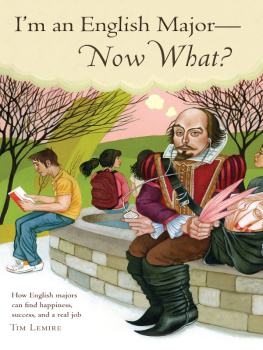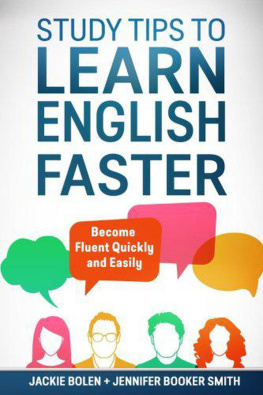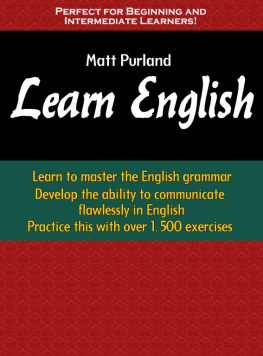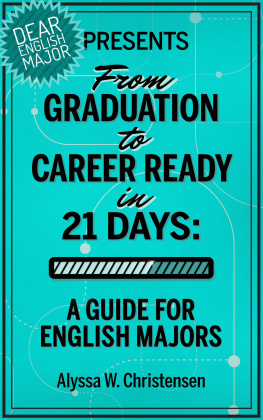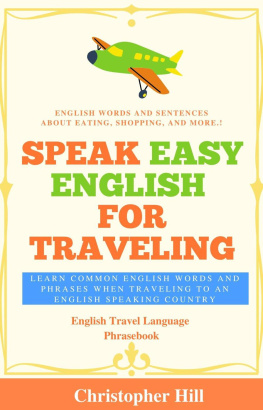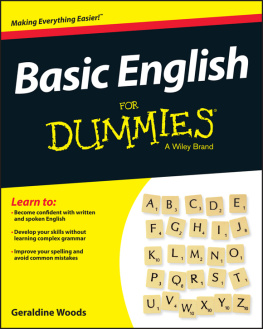
Im an English Major
Now What?
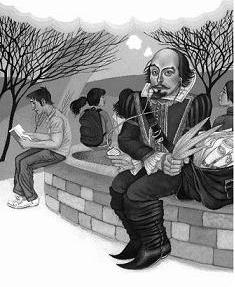
How English majors
can find happiness,
success, and a real job
TIM LEMIRE

WRITER'S DIGEST BOOKS
writersdigestbooks.com
Cincinnati, Ohio
Im an English MajorNow What? Copyright 2006 by Timothy Lemire. Manufactured in the United States of America. All rights reserved. No other part of this book may be reproduced in any form or by any electronic or mechanical means including information storage and retrieval systems without permission in writing from the publisher, except by a reviewer, who may quote brief passages in a review. Published by Writers Digest Books, an imprint of F+W Publications, Inc., 4700 East Galbraith Road, Cincinnati, Ohio 45236. (800) 289-0963. First edition.
10 09 08 07 06 6 5 4 3 2 1
Distributed in Canada by Fraser Direct
100 Armstrong Avenue
Georgetown, ON, Canada L7G 5S4
Tel: (905) 877-4411
Distributed in the U.K. and Europe by David & Charles
Brunel House, Newton Abbot, Devon, TQ12 4PU, England
Tel: (+44) 1626 323200, Fax: (+44) 1626 323319
E-mail: mail@davidandcharles.co.uk
Distributed in Australia by Capricorn Link
P.O. Box 704, Windsor, NSW 2756 Australia
Tel: (02) 4577-3555
Library of Congress Cataloging-in-Publication Data
Lemire, Tim.
Im an English majornow what? : how English majors can find happiness, success, and a real job / by Tim Lemire. -- 1st ed.
p. cm.
ISBN-13: 978-1-58297-362-3 (pbk.: alk. paper)
ISBN-10: 1-58297-362-8
1. Vocational guidance. I. Title: Im an English major. II. Title.
HF5381.L3525 2006
650.1--dc22
eISBN: 978-1-59963-346-6
2005035555
Editor: Jane Friedman
Designer: Claudean Wheeler
Cover Illustration: Caitlin Kuhwald
Production Coordinator: Robin Richie

Dedication
To majors in English everywhere:
past, present, and future
Table of Contents
Introduction
If you graduated from college with a degree in English, the first thing you should know is that theres no need to panic. Have a seat, take a deep breath, and read on, Macduff.
People typically choose to major in English because they love literature, reading, and writing. Then, when they enter the workforce, they discover they also love eating, preferably something other than cold baked beans out of a can.
Not to worry.
This book offers information and guidance to English majors who wish to translate their skills into a job in their fieldeven if they dont exactly know what that field will be. This book also dispels common fears about the major in English, primarily:
that English majors career options are severely limited
that English majors will never make good money
that English majors skills have no currency outside of academics
This book addresses common questions among English majors, including:
Do I need to go to journalism school?
Should I get my MFA in creative writing, and when?
How do I begin a freelance career in editing or writing?
This book will also refute misconceptions held by English majors, such as:
the fatalistic belief that all you will be able to do in the world is teach English
the idealistic belief that you can make a reasonable postgraduate living from writing the kinds of poems and novels you read as requirements for your major
The latter belief, if not more common, surely runs deeper. Some undergraduate English majors I talk to refer to their future of writing plays as if there were an office building somewhere in midtown Manhattan crammed with scribbling playwrights working against deadline; and at least one young person has shared with me his crafty strategy of taking an entry-level job in book publishing to advance his chances of getting his own (yet unwritten) novel published. Suffice to say that you are ill-served by your college or university if you walk out of its gates (as I did) thinking that one day, as you are filling out a form, you will enter Literary Novelist or Poet under Occupation.
As for teaching, well address that noble occupationand othersin the pages to come, which feature interviews with English majors who have gone on to establish themselves in a variety of occupations.
A disclaimer: My opinions do not necessarily reflect those of the professionals I have interviewed, nor should their willingness to participate in this book be interpreted as a tacit endorsement of my views. The information in this book is based on my own experience: If what I write does not sound kosher to readers ears, I encourage them to talk to more people, research, investigate, and put my information to the test.
Or, as is said more succinctly in journalism: If your mother says she loves you, check it out.
CHAPTER 1 Im an English Major
English, huh? Well.
Good for you. So
What are you going to do with that?
After all, physics majors become physicists; psychology majors become psychologists; and even history majors become historians. What do English majors become?
Englishists? Englishologists?
Waiters?
To be sure, majoring in studio art or medieval philosophy or medieval studio art prompts a stronger parental spit-take than the declaration of a major in English: for, surely, Mom and Dad have some acquaintance with the English language and can imagine, vaguely, that English may prove useful in a white-collar office environment where you can earn a good salary and get a decent dental plan. The English major involves a lot of reading and writing, and people do do that, dont theyI mean, in real jobs?
Indeed they do.
This fact alone should encourage you and give you hope for gainful employment. The jobs are there, as is happiness and successprovided you know who you are, what you can do, what you want, and where to look.
So, What Can English Majors Do?
Before we examine specific jobs, lets break down the major in English into its fundamental skills. Obviously, each of the colleges and universities across America has a different set of requirements for the major in English, but its fair to say that, to earn a degree in English, you must be able (at a bare minimum) to read two three-hundred-page novels and write a five-page paper about them. If you can do this, you can:
assimilate and synthesize large amounts of information
identify and summarize important points
translate large concepts into succinct language
do all of the above against a deadline
Writing papers requires you to develop skills in:
research
information management
argumentative or persuasive writing
proper grammar and usage
acting as your own editor when revising and correcting your work
Taking on a variety of writing assignments trains you to:
customize your style and voice for particular audiences
develop a versatility in planning, thinking about, and executing assignments
develop skills in multitasking and project management
Luckily, these skills are wanted in more than just the teaching profession. So where are they? Where are the jobs to which such skills could be applied?
Where the Jobs Are
In my own teaching days, I told my students that where there are wordsin newspapers and magazines; in magazine ads; on cereal boxes; in the instructions to your MP3 player; in books, brochures, and on billboards and in junk mailthere are people who write the words. There are people who check for factual accuracy, correct spelling, and proper grammar. There are people who then rewrite the words, and there are people who incorporate graphics and visuals with the words. There are people who see to it that the words are printed and published and delivered into your hands. There are people who write words in order to market and sell the products that have words on them.
Next page
